14
The Chippewa band who lived around the Babtiste and Nordegg Rivers prided themselves on being self-sufficient. Once the buffalo were gone, the members of this band would hire themselves out to the farmers of the Rocky Mountain House district, and help clear brush in the spring and help with harvest in the fall of the year. But there was little work for the Chippewa band members in the summer and fall of 1931. Henry Stelfox could see plainly that his Indian friends were close to starving, as they couldn't pay for any food from the merchants in Rocky Mountain House. The Department of Indian Affairs was informed of the 'very lean times the O'Chiese band of Chippewas were experiencing' and a shipment of clothing and food arrived in late December of 1931. Henry enlisted the help of his brother Tom to load a triple wagon box sleigh and hitch up a very strong team to head out across the snow-covered trail and frozen muskeg to reach the Chippewa's winter encampment. It was 35 degrees below zero (equal to minus 37 Celcius) and with a foot of snow on the ground, the trip would take them three days, as there were no proper roads in that district to take them out to the Nordegg River. One part of the trail was through a canyon, and the trail wasn't level, and try as they might to balance the load by standing on the uphill side of the wagon, Tom and Henry didn't weigh enough to to keep the load from upsetting. It took them quite a bit of work to move all of the boxes out of the way before they could right the sleigh and sleighbox and reload the boxes. As they continued through the canyon, the load upset five times. When they arrived at the Chippewa village, Henry and Tom set up their own tent, and had supper. After supper, Henry saw his old friend Yellowface emerge from his tepee. Henry could see that Yellowface was saying his evening prayers. After waiting a few moments, Henry greeted Yellowface, and told him the purpose of their visit. Yellowface returned to his own tepee, and then Yellowface's cousin came to see Henry. The cousin told Henry that they would not accept any food or clothing from the government, and that the items were not to be left in the village. Two more representatives came to Henry's tent and told him that they did not want any of the items that Henry had brought. After working so hard to deliver the warm clothing and boxes of sugar and tea, and flour, it must have been a head-shaking moment for Henry. When Yellowface returned to see Henry later that evening, he asked what the men who had visited Henry had to say, and so Henry related that Yellowface's cousin gave the word that no one was to accept any of the goods from the government. Yellowface said that he wouldn't go against the wishes of his people on the matter, (it was a delicate line that Yellowface walked, as his uncle Chief Jim O'Chiese had passed away only a month previous). Yellowface wished Henry to convey his gratefulness for the Director of Indian Affairs thoughtfulness in sending food and clothing.Yellowface invited Henry and his brother to attend the Christmas feast that evening. Henry said he would be pleased, and that he wished to give Yellowface a gift from his own house, including tobacco, bacon, cookies, bread, butter, lard, and apples, oranges and nuts. Yellowface gladly accepted the gifts that came from Henry personally, and the three men proceeded to the assembly hall for the feast later that evening. The ceremonial pipe was lit and passed around, speeches were made, and then the feast began.
Henry and Tom returned to Rocky Mountain House, but avoided the canyon that had caused so much trouble for them on the way in. In the New Year, Henry was able to divide the shipment into smaller parcels, and when individuals from the O'Chiese Chippewas would visit Henry in town, Henry would present them with a gift, saying only that a friend had sent it. It took Henry most of the year, but all of the food and clothing finally made it to the people first intended.
15
Hunting camp1920 -1940
The West Country, west of Rocky Mountain House, Alberta, Canada
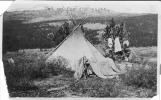 Credits:
Credits:"Rambling Thoughts of a Wandering Fellow: An Natural History of Wildlife, Native Peoples, Homesteading, and Conservation in Western Alberta: 1906 - 1968 by Henry Stelfox
16
Corral and loading chutes on the Sunchild Reserve20th Century, Circa 1967
Sunchild Cree Reservation, Baptiste River, Alberta, Canada
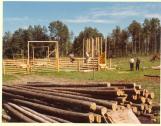 Credits:
Credits:Unknown
17
Lumber mill on the Sunchild Reserve20th Century, Circa 1967
Sunchild Cree Reservation, Baptiste River, Alberta, Canada
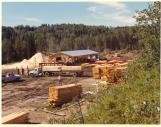 Credits:
Credits:Unknown
18
New house and old cabin on the reserve20th Century, Circa 1967
Sunchild Cree Reservation, Baptiste River, Alberta, Canada
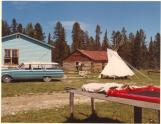 Credits:
Credits:Unknown
19
Henry Stelfox visiting Chief Yellowface's grave20th Century, Circa 1970
Prairie Creek, South of Rocky Mountain House, Alberta, Canada
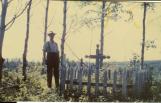 Credits:
Credits:Unknown
20
Sacred pole for the Sundance20th Century, Circa 1960
Sunchild Cree Reservation, Baptiste River, Alberta, Canada
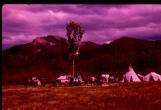 Credits:
Credits:Unknown
21
Sundance Lodge20th Century, Circa 1960
Sunchild Cree Reservation, Baptiste River, Alberta, Canada
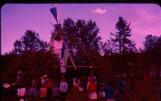 Credits:
Credits:Unknown
22
During the 1930's and 1940's, tuberculosis weakened and sickened many of the First Nations people that lived in Alberta. Henry was concerned for the health of the Indian families he knew, and encouraged any public health measures aimed at preventing the spread of the disease. At this time, the First Nations people requested that Henry Stelfox be their representative, (emphasis on "their") on matters pertaining to the Department of Indian Affairs. Henry devoted many hours of his free time to write letters, assist a number of Indians in claiming Old Age Security benefits - this often entailed interviewing many of the tribe's elders in order to determine the year of birth of the individual who was applying for Old Age Security - and keep as accurate records as possible of the number of people who were living in the Indian settlements northwest of Rocky Mountain House. For all of his time and efforts, Henry Stelfox refused any remuneration, for he was afraid of being caught in a position where he could not firmly stand for the best interests of his Indian friends.It was not always easy to be the Indian agent for Rocky Mountain House. At one point, Henry received a letter from a representative of the Department of Indian Affairs that Henry should expect a small band of Cree Indians from the Battleford (Western Saskatchewan) area to migrate to the Rocky Mountain House area with the aim of finding land for a reservation. The leader of this group was Chief Sunchild, and Henry had no idea when Chief Sunchild would arrive. When Henry Stelfox began receiving reports from homesteaders in the Prairie Creek area that some Indians were camping on their farms, and causing damage to fences, Henry decided to ride out to Prairie Creek to see who was camping out there. It was Chief Sunchild and his band. When Henry asked who was the leader, he was directed to speak with Chief Sunchild. Chief Sunchild was not at all friendly to Henry, and would not take the suggestion that he and his band members should move off of the land that had been given to homesteaders very readily. Chief Sunchild did not want to listen to Henry Stelfox's explanations of what land was available to be surveyed for treaty, and told Henry that he would talk to the King, and only to the King, when he, Chief Sunchild had found suitable land to call home.
When Chief Sunchild did actually speak to Henry Stelfox three years later on the subject of land for a reservation, no agreement was reached, as Chief Sunchild requested the land that reached from the west bank of the North Saskatchewan River west to the British Columbia - Alberta boundary, and from the north bank of the Clearwater River to the south bank of the Brazeau River. Even after Henry Stelfox explained that such a request was unreasonable, as there were federal parks and entire towns that lay within those boundaries, Chief Sunchild said that he wanted all of it. In the end, Chief Sunchild did not enter into treaty.
23
On April 29, 1936, at the age of 85, Chief Yellowface died. He was buried on the north bank of Prairie Creek, southwest of Rocky Mountain House. Chief Yellowface's last words to Henry Stelfox were "N'Istes Makkesis. Kekway wegitteyani takki kiskisi Kye-Manitou Ka pimatjihisk" which means 'My brother Fox. In all which you do think of God who gives you life.' Chief Yellowface never entered into treaty.Chief Sunchild died in 1938. He was buried on the north bank of the Baptiste River. Four years after Chief Sunchild's death, his son Louis Sunchild came to see Henry Stelfox to tell Henry that his band now wished to begin negotiations with Ottawa for treaty. Henry Stelfox petitioned Ottawa and sent word that a number of leaders of the Chippewa encampment were also interested in coming into treaty at the same time as the Sunchild Cree.
In 1944, Henry Stelfox succeeded in his efforts to convince the Department of Indian Affairs in Ottawa that a majority of Cree and Chippewa families were finally ready to sign treaty. There were many meetings and lengthy discussions held with the First Nations people. Ottawa assigned a land surveyor to accompany Henry in laying out the previously prescribed areas near the Baptiste and Nordegg Rivers. Federal money was provided to build new houses, corrals, and a sawmill on the Sunchild Cree Reserve, and Henry was quite pleased that many of his friends now had proper housing, access to school, and suitable employment. However, a small group of the O'Chiese Chippewa left the area being set aside for the reserve, and travelled northwest to Entrance, an area west of Hinton, Alberta.
Although Henry Stelfox retired in June of 1945 as representative of the First Nations people, in the Rocky Mountain House area, Stelfox continued to worry about all that was promised to the Indians, and all that Peter O'Chiese's small band was missing by staying out of treaty. Henry and Peter O'Chiese continued to correspond for a number of years, albeit sporadically. (After the Treaty signing in June, 1945, Ottawa hired another man to be the Indian agent and government representative for the Rocky Mountain House area.)